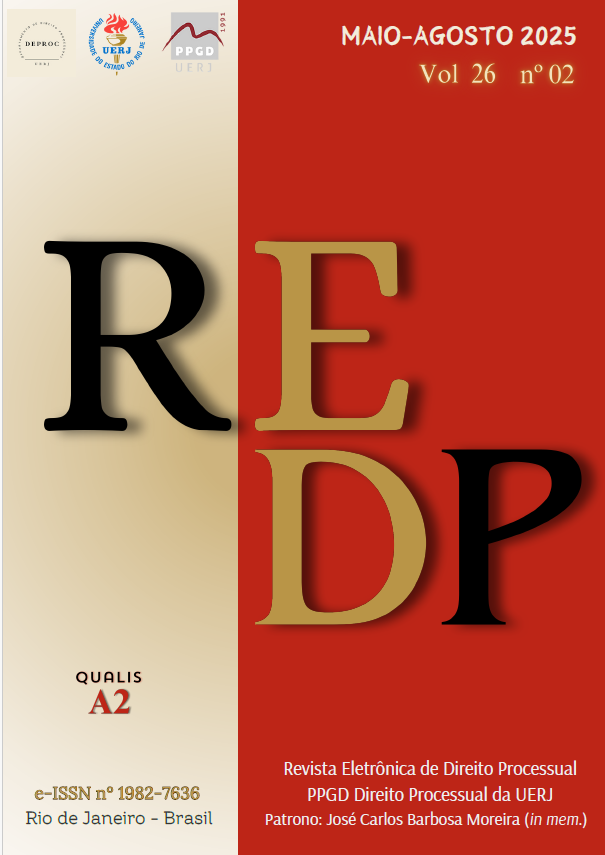JULGAMENTOS VIRTUAIS X (TELE)PRESENCIAIS:
testando empiricamente a influência do Plenário Virtual como fator decisório nas Câmaras de Direito Público do TJPE em 2022
DOI:
https://doi.org/10.12957/redp.2025.79741Resumo
Como a virtualização do julgamento pode influenciar o seu resultado? Com base nesse problema de pesquisa, a presente investigação pretendeu testar empiricamente a influência do Plenário Virtual como fator decisório nas Câmaras de Direito Público do TJPE em 2022. A problemática emergiu do senso comum de que os resultados dos processos julgados virtualmente tendem a ser improvidos, sendo esta a hipótese central da pesquisa. Do ponto de vista teórico, a virtualização do julgamento é um fator metaprocessual que pode interferir na tomada de decisão. À luz da psicologia cognitiva e da economia comportamental, tal fator é capaz de gerar vieses cognitivos, notadamente ligados à tendência em confirmar a decisão já tomada por um par. Contudo, a problematização em questão demanda uma análise empírica do problema. Assim, para responder à pergunta de pesquisa, foi necessário: (i) identificar os regramentos relativos à eleição processual para julgamentos virtuais; (ii) analisar o fator decisório metaprocessual e sua incidência sobre a virtualização do julgamento; (iii) levantar e catalogar os dados nos seguintes grupos: (a) Número do Processo Único - NPU; (b) órgão julgador; (c) data de julgamento; (d) tipo de julgamento (virtual ou não); (e) resultado do julgamento (improvido ou provido); e (iv) verificar as informações e dados colhidos. Para tanto, a metodologia utilizada foi empírica, de natureza quantitativa, com análise descritiva. Com isso, foi possível verificar que há uma divergência estatística a partir da forma de julgamento, havendo maior tendência de as Câmaras de Direito Público do TJPE julgarem improvidos os recursos em julgamentos virtuais, confirmando-se a hipótese levantada. Ao fim e ao cabo, a presente pesquisa tem utilidade prática ao cotidiano do operador de direito, seja ao magistrado interessado em inibir modelos de julgamento que o enviesam, seja aos advogados e interessados em julgamentos mais favoráveis às suas partes recorrentes a título de estratégia de minimização dos riscos de sucumbência.
Downloads
Publicado
Como Citar
Edição
Seção
Licença
Copyright (c) 2025 Alexandre de Paula Filho, João Paulo Pessôa Pereira Lustosa, Lúcio Grassi de Gouveia

Este trabalho está licenciado sob uma licença Creative Commons Attribution 4.0 International License.
Todos os artigos publicados na Revista Eletrônica de Direito Processual (REDP) (Departamento de Direito Processual, Universidade do Estado do Rio de Janeiro, Brasil) são licenciados por meio de uma Licença Creative Commons - Atribuição 4.0 Internacional (CC BY 4.0).
Os autores retêm os direitos autorais de seu artigo e concordam em licenciar seu trabalho com a licença CC BY 4.0, aceitando assim os termos e condições específicos desta licença disponíveis no seguinte website: https://creativecommons.org/licenses/by/4.0/legalcode.
- Os autores concedem à REDP o direito de primeira publicação, de se identificar como publicadora original do trabalho e concedem à revista uma licença de direitos não exclusivos para utilizar o trabalho das seguintes formas: Reproduzir, vender e distribuir cópias eletrônicas ou impressas do manuscrito como um todo, de partes específicas do manuscrito e de suas traduções para qualquer idioma;
- O uso do artigo por terceiros é livre, contanto que a integridade da publicação seja mantida e seus autores originais, periódico de primeira publicação e detalhes de citação sejam identificados.
Dentro dos termos da licença, os autores podem entrar em acordos contratuais adicionais separados para a distribuição não exclusiva da versão publicada do trabalho na revista.
Copyright and Licensing
All articles published in the Procedural Law Electronic Review (REDP) (Department of Procedural Law, State University of Rio de Janeiro, Brazil) are licensed under a Creative Commons License - Attribution 4.0 International (CC BY 4.0).
- Authors retain copyright to their article and agree to license their work under the CC BY 4.0 license, thereby accepting the specific terms and conditions of this license available at the following website: https://creativecommons.org/licenses/by/4.0/ legal code.
- Authors grant REDP the right of first publication, to identify itself as the original publisher of the work, and grant the journal a non-exclusive license to use the work in the following ways: Reproduce, sell and distribute electronic or printed copies of the manuscript as a whole, of specific parts of the manuscript and its translations into any language;
- Use of the article by third parties is free, as long as the integrity of the publication is maintained and its original authors, first publication journal, and citation details are identified.
Within the terms of the license, authors may enter into separate additional contractual agreements for the non-exclusive distribution of the published version of the work in the journal.




